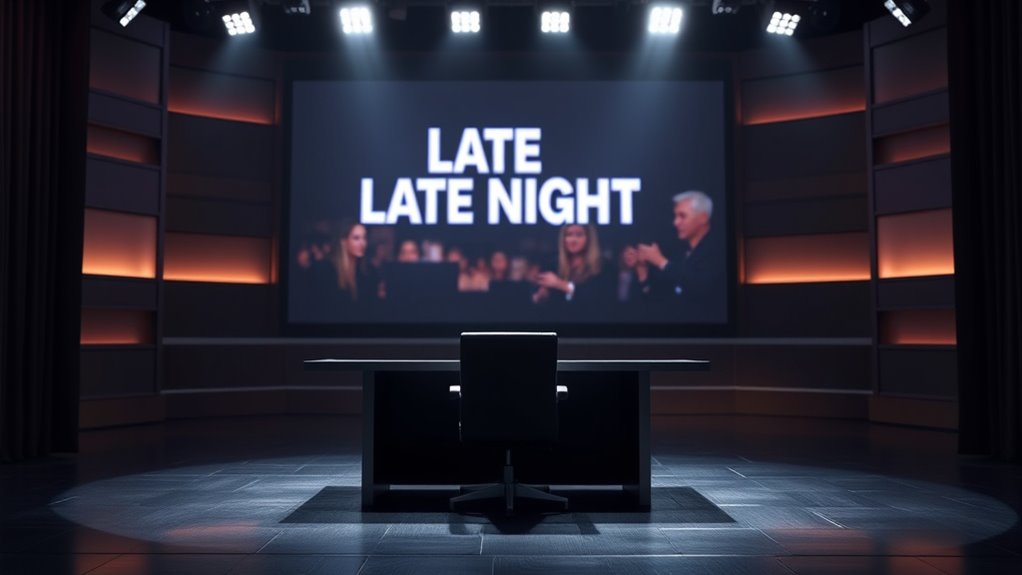The sidelining of Jimmy Kimmel highlights growing concerns about the independence of late-night comedy amid political and regulatory pressures. Recent controversies, like his joke about Charlie Kirk, show how political figures and authorities can influence network decisions. This shift risks limiting free expression and turning late-night shows into tools of political agendas. To understand how these developments could reshape the industry and what it might mean for your entertainment, explore the factors behind this caution.

The suspension of ABC’s “Jimmy Kimmel Live!” has sparked widespread debate over political influence in entertainment. You might see this as a clear sign that the boundaries between comedy, journalism, and politics are blurring more than ever. Kimmel’s comments about Charlie Kirk’s death, made in a politically charged context, quickly ignited controversy. His joke, perceived as critical of MAGA supporters attempting to politicize a sensitive murder case, prompted an immediate response from authorities and networks alike.
Kimmel’s politically charged joke about Charlie Kirk ignited controversy and drew swift responses from authorities and networks alike.
What makes this incident remarkable isn’t just the content of Kimmel’s joke but the reaction it triggered. FCC Chair Brendan Carr, a Trump appointee, publicly called for the show’s suspension, citing the remarks as inappropriate. This move signals that political figures, especially those aligned with conservative agendas, are increasingly willing to influence entertainment by pressuring networks to act against content they find controversial. ABC’s decision to suspend Kimmel indefinitely appears to be a calculated response to avoid potential regulatory and political fallout, especially since the FCC’s involvement coincided with a major merger deal requiring their approval. This suggests that the show’s suspension might have been less about the content itself and more about political leverage. Additionally, the current market growth in entertainment technology reflects a shifting landscape that could affect how content is produced and regulated.
The reaction from industry insiders and politicians paints a picture of growing concern about censorship. Many entertainment labor unions and Democratic politicians, including Senator Chuck Schumer and Governor Gavin Newsom, condemned the suspension, framing it as an attack on free expression. They argue that this move sets a dangerous precedent—one where political pressure can silence outspoken voices in comedy and commentary. The incident has become a flashpoint for broader fears about the future of late-night television, which has historically thrived on edgy humor and bold political commentary. Now, it faces an uncertain landscape where network decisions could be influenced by fear of regulatory repercussions or political backlash.
Public opinion remains divided. Some see the suspension as necessary to prevent provocative and potentially harmful content, while others view it as censorship that undermines journalistic and comedic freedoms. Supporters of Kimmel have taken to social media, vocally defending his right to satirize politics, while critics argue that certain topics cross a line. This polarization reflects the larger societal divide over free speech and political influence. The incident also prompts questions about the future of late-night TV: Will hosts feel freer or more restrained? Are networks willing to risk political interference for the sake of controversy? As late-night shows grapple with this new reality, the line between entertainment and political control seems more blurred than ever. Additionally, FCC regulatory measures are increasingly impacting programming decisions across the industry, further complicating the landscape for content creators and broadcasters alike.
Frequently Asked Questions
How Has Kimmel’s Absence Affected Late-Night Show Competition?
Your absence from Kimmel’s show has shifted the late-night landscape considerably. You notice rival shows gaining viewers, securing more high-profile guests, and increasing social media engagement by about 18-25%. Advertisers reallocate budgets, and online clips of competitors grow in popularity. You realize this period has created a more competitive environment, with networks emphasizing stability and consistency to attract audiences, which could lead to long-term changes in late-night TV dynamics.
What Are the Long-Term Impacts on Late-Night TV Diversity?
You see that late-night TV’s diversity is shrinking, even as America’s demographics grow richer. While on-screen representation declines, the industry’s focus on ratings and profits deepens the gap, risking alienating diverse audiences. This narrowing of perspectives limits cultural dialogue and weakens audience engagement. Over time, this could lead to a less inclusive media landscape, diminishing late-night’s role as a platform for varied voices and meaningful conversations.
Who Are the Potential Successors for Kimmel’s Time Slot?
You should consider that ABC might fill Kimmel’s slot with existing late-night hosts, leveraging their established audiences to guarantee stability. Alternatively, they could introduce emerging talent, looking for fresh faces who connect with younger viewers through social media and new formats. Networks might also explore locally produced or syndicated shows, giving opportunities to diverse voices and experimenting with hybrid entertainment styles to attract wider demographics.
How Does This Shift Influence Political and Social Commentary?
You’ll notice a quieter, less fiery tone in political and social commentary. Without Kimmel’s sharp satire cutting through the noise, the discourse may soften, becoming more cautious and less daring. This shift dims the spotlight on pressing social issues, making conversations less provocative. As a result, you might find fewer bold opinions on your late-night screen, nudging viewers toward podcasts or digital outlets for the raw, unfiltered takes they crave.
Will Kimmel Return to Late-Night Television in the Future?
Kimmel’s return to late-night TV isn’t guaranteed yet. The indefinite suspension depends on FCC regulations, ABC’s decisions, and the evolving political climate. You should keep an eye on industry reactions, public opinion, and potential negotiations. While pressure from unions and supporters might eventually push ABC to bring him back, the current environment suggests his future remains uncertain, and a comeback may take time.
Conclusion
Ultimately, sideline shifts hint at a changing landscape where tradition gently makes room for new voices. While some may see these moves as a pause or a shift in the spotlight, they subtly remind us that even in the world of late-night, evolution is inevitable. As the curtains draw on familiar routines, it’s clear that adaptability and fresh perspectives will continue to shape the future, softly guiding the genre into new, uncharted territory.









